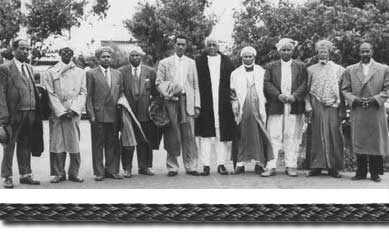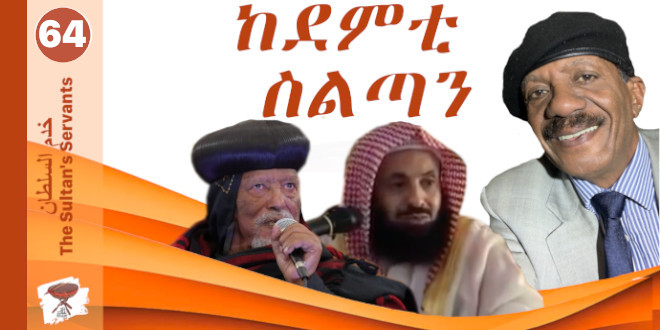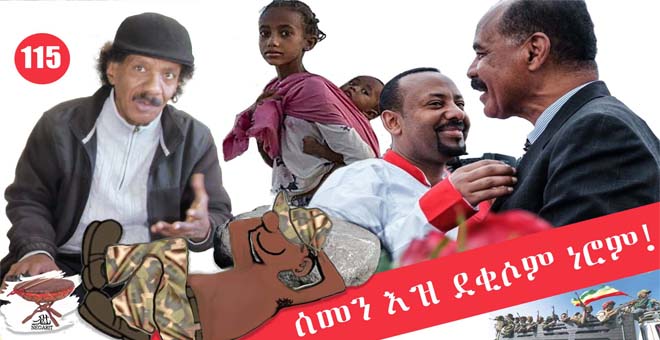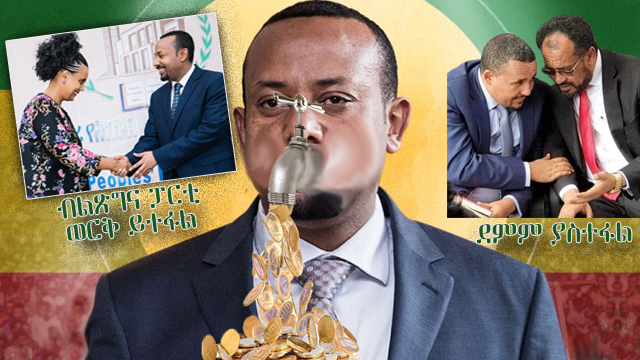“Crusaders” Branding Others, “Islamists”

Today’s Negarit is about Yosef EFND, coincidentally, there is an Egyptians word that sounds like it, Effendi (افندي); it is attached before the name of a Western clothed and educated persons. In many countries, the mandarin orange is also called Yousif Effendi—I am glad I found a pet name for my friends, the Yosef EFNDi.
Reconciliation has been my motto for a long time and in time I coupled it with freedom of expression; these two are dear to my heart because they cut through everything I stand for. Like many others, I have made huge investment on these two; I recognize that our salvation lies in truth and reconciliation—twin ideals that are the cornerstone of our nation. Surely I am disappointed by our collective failure as a nation to show meaningful achievements, and I share all the frustration that plagues us. However, God knows I have tried my best and I will continue to do so despite the setbacks. It has never been my habit to shy away from controversy not to annoy my friends and compatriots, because I have a promise to keep.
Reconciliation is a common national interest and I embrace everything and anything that produces the tiniest contribution to it. It’s with this spirit that I write this edition of Negarit; my intentions are, as always, to help in correcting wrong positions and to show a different, sometimes uncomfortable, perspectives. I do this not out of malice, but because I have made it my life’s mission to “inform, inspire and embolden” my fellow Eritreans, so we can achieve the reconciliation that we desperately need and deserve.
Today’s edition could be read as a follow-up to my article of April 17, 2014, “The Politics Of Nouns And Topography.” But this time it expresses my envy of the “Crusaders” within the “Eritrean for Facilitating National Dialogue” (EFND), who present themselves as “reconcilers” when they haven’t reconciled themselves with their conscience. Yet, they have the temerity to identify themselves as “progressive liberals” and others as “Islamists.” I am one of their victims and I really envy them. And I wonder: why do most people meekly pass such outrageous branding instead of challenging the bigots? What if I start to call anyone I do not agree with as an “Islamist” or a “Crusader”? But I am resisting though I am being provoked to do that. Attacking individuals on their strength is an evil tactic that bigots use.
Any Muslim Eritrean whose name they don’t like is simply branded an “Islamist” and “Jihadiast.” Thanks to the Western media, the two brands have been overly repeated, promoted, and became accepted political lexicon, a useful tool that some of the drivers of EFND liberally used.
In the outset, I have a disclosure to make: this message is general, but specific to a few individuals—they know themselves: the self-proclaimed “progressive liberals.” But there is a Christian equivalent of “Islamists and Jiahdists,” and it snugly fits them: Crusaders.
In August 2013, when the EFND group held its first conference in Arlington, Virginia, they had these names that resemble a meeting of relatives, a village “Uqqub” club:
Dr. Okbazghi Yohannes
Dr. Afeworki Paulos
Dr. Kidane Mengisteab
Dr. Ghirmai Negash
Dr. Mantai Mesmer
Dr. Yebio Woldemariam
Mr. Teklai Abraha
Mr. Tesfagiorgis Ghebreslassie
Dr. Angessom Atsbaha
* Mr. Amanuel Hidrat
* Mr. Tewolde Stephanos
* Three scholars requested their names not to be listed, but I do not have to guess their names.
In October 2014, they met again in Vienna, Virginia, and they had these names—you cannot miss the one name that makes it “diverse!”
Dr. Okbazghi Yohannes
Dr. Araya Debessay
Dr. Yebio Woldemariam
Dr. Tseggai Isaac
Habtom Yohannes
Amanuel Hidrat
Beyan Negash
Dr. Awet T. Weldemichael
Tewelde Stephanos
Unquestionably there was an attempt by a few genuine activists among them to make the meeting inclusive, but a frantic shopping for Muslim participants didn’t yield much as the list shows. Still, I don’t think those who brand themselves “progressive” learned the lesson in which they have been repeatedly failing Eritreans—since the days of the sectarian “Eritreans for Liberation in North America” (ELNA), which is widely remembered by its Tigrinya acronym, “Enasa’a” and whose legacy is still crippling the Eritrean struggle.
An old friend who used to live in Ethiopia once told me that he made a business trip to the USA in the mid-seventies; he was a staunch supporter of Popular Liberation Front (identified with Isaias and Sabbe jointly). In the East Coast he attended a wedding party and was surprised to hear the Enasa’a crowd badmouthing Sabbe in a gwayla song they were playing: “Sabbe AdHarhari; yaAaho, AdHarHari!” My friend said, “I knew Sabbe as the leaders of the organization that I supported and here the cadres were branding him as a sectarian and corrupt leader!”
May Sabbe’s soul rest in peace, he was abused by many Eritreans like no one else in our modern history.
The sting of that gwayla’s bug must have been dormant, it awakened in the mid-nineties and my friend of yesteryear admonished me for my anti-PFDJ stand; he severed our friendship.
As I remember the story today, I am afraid a few individuals might severe their friendship with me after reading this, but I can’t help it; my choice is to sleep on the proverbial railroad.
The ENFD communiqué sounds very genuine about inclusiveness and diversity. Its members portrayed an inclusive character, particularly when they moved frantically to recruit Muslims while preparing for the meeting. Alas! They failed to attract anyone who doesn’t look like them. Yet, they never took a pause to honestly ask themselves why they failed! Did they try having a diverse network of friends to begin with? I am hoping my advice, which I am repeating for the umpteenth time, helps them and all pro-justice Eritreans to find the real cause.
Any segment of a nation has a national concern that is shared by everyone else, and its own particular concern related to its citizenship rights. For example, on national issues, liberal and patriotic Muslims should be concerned when the PFDJ trespasses into the Orthodox Church affairs. Since that concerns half their compatriots, it immediately becomes their issues and they should struggle against the transgression by openly expressing their objection. Similarly, patriotic Christians should be concerned about Muslim issues because it concerns half their compatriots. That way, we can all have a complete national cause, undivided. And that helps us reconcile with our conscience, and among ourselves.
It is an established fact that Muslims are absent in most Eritrean Diaspora meetings in the West. This concerns many Eritreans and they try their best to narrow the gap while a few view it as a normal affairs of business. I know that Muslims, with the exception of a few, are not interested in monologues performed by initiatives like that of the EFND, similarly, Christians are not interested in Muslim monologues.
Courage is needed to raise issues that are mostly swept under the table. Citizens should raise real issues and decide if they are national or not. If they are of national proportions, concerning any segment of our society, they should be adopted in the different programs. We should advocate for them as our own individual national issues. Then, the much abused jingle of “our unity” will be replaced by real concern for reconciliation and national unity. And it will not be difficult to achieve because everyone seems to subscribe to it.
Reading the 17-page EFND “working memorandum”, one is struck by the lack of concern for the refugees in Sudan, the land of Western Eritrea, the cultural issues concerning Muslims, etc. And these are not fringe issues; they run deep within the Eritrean Muslim grievances. Instead, the EFND document is full of Kenyan, Chinese, and Somali examples; it exposes the ignorance and shallowness of the group regarding Eritrean issues. The document gives the impression that the boundaries of Eritrea stops at the confines of the Highlands, or at Ad-Teklezan, as Herui T. Bairu once remarked. I suppose the ample PhD holders would know about Eritrean geography, if not its different segments.
It is disheartening that some people lurk someplace until the struggle reaches what appears to be the pinnacle, and then they emerge expecting people to receive them with red carpets. They come out late from their slumber and instead of humbly adding their energy to the struggle, they attempt to grade other activists who have been in the fry for too long—perhaps they feel they are our teachers and we were waiting for them to grade our exam papers! But if you take the initiative and liberty to grade others, they have the obligation to grade you as well.
The four people who were doing the invitation for the last EFDN get-together are: Dr. Afwerki Paulos, Dr. Okbazghi, Dr. Kidane, and Dr. Araya Debessay. And if you haven’t guessed it so far, please understand that I have no issues with any of them. I might even enjoy their company, or debating them; I am just doing my best to help them see another perspective that they might consider acceptable in private, but taboo in public. It’s about time that such issues are taken more seriously. The EFND’s initiative and efforts are good, but the substance, instead of being positive, it has a negative contribution. Now, before I go any further, let me introduce them to you.
Dr. Afwerki Paulos‘ bio is the most prominent: he appeared in a video clip in 1993 in a public meeting where Isaias Afwerki was present. Since then, he was apparently studying the Eritrean struggle and in 2010 he openly dived into the opposition camp just prior to the Awassa congress where he was elected an MP (actually its equivalent). His achievement? It is a feat because he, “asked Isaias about the Asmara University debacle in a 1993 public meeting in Washington, DC!” Though a member, he also had a role in crippling the Eritrean National Council which was born deformed and suffocated in its infancy.
Dr. Araya Debessay is among my favorites. He likes to come up with many proposals and initiatives, but he quickly gets bored and disappears. He doesn’t approve of the organized political parties and would like to replace them with seasonal activists—so much for inclusiveness! In short, Dr Araya likes to start everything from scratch, every other season.
Dr. Kidane Mengisteab: Who? I heard of him a few years ago when my friend Kasahun Chekole sent me a book Dr. Kidane wrote (or co-wrote, not sure) about Eritrea. I can’t say much about the book, but he is apparently more into Kenya, Uganda, and others than Eritrean issues.
Dr. Okbazghi Yohannes: a gentleman of whom I always hear good things but never had the chance to meet—unfortunately bsenki ngutz yneded rHus [live wood burns because of its proximity to deadwood.] I wish he was not in the list, but I still I have a great respect for him.
Do you think some of these people have any moral authority to brand anyone, with any negative brand at all? Okay, if someone they do not like is a Muslim, he is conveniently branded an Islamists! And this is why I envy the bigots among them; bad luck for me, the Islamist and Jihadist equivalent brands for Christian bigots is Crusaders, but it is not well promoted.
As for the rest of the crowd affiliated to EFND, I would like to make the following exclusions from the target of this edition of Negarit: I exclude my friend Amanuel Hidrat and Girmai Negash from any of the above; and the invitees who tried to challenge and educate the EFND initiators about their crooked approach to national issues; the delegates of the political organizations including Mulu Negassi (bless her heart) and others; and of course I forgive the generous who are, pen-in-hand, ready to endorse anything they see. As for the disappointing individuals, suffice to say that I do not respect their judgment, their wishy-washy positions, and their shallowness.
Now that I have expressed what needs to be expressed, let me go to the advice.
“Sebqet AlAhmadi,” [The Ahmadi Paint] is a Kuwaiti saying which unfortunately I will not explain in detail because its origin is contested. It’s commonly uttered to expose a fake product or pretentious behavior, meaning something camouflaged and presented to look or sound like what it is not. Therefore, if we remove the veneer of paint, however we define EFND, it is an equivalent to the other regional and sectarian groups. No camouflage will hide that. EFND would be better off admitting that and embracing it openly. If it is really concerned about reconciliation, and since its membership is a sectarian group that expresses its fear of “Islamists” and “closet Jihadists” (basically anyone with a Muslim name), it can only meet and discuss with movements that equally suspect and fear its politics and aspiration of hegemony. It should know that there are others who shudder at the mention of the names of its members. I advise EFND members to openly brand their group “Nhnan Elamanan“, with courage, and advance Kebessa/Christian issues that they feel they represent; then they can meet their equals who I am sure would openly tell them what is wrong with them and their attitudes and approaches.
The second part of my advice is for EFND to meet the Eritrean Lowland League (ELL) because it is their best option. It would be good for the struggle if the two would discuss all issues and reach a consensus, though there is a snag: EFND doesn’t have a fraction of ELL’s constituency, therefore, humbleness is essential. It is also a condition that must be met for my advice to work.
The third part of the advice is for EFND to leave the liberal democrats alone because they don’t have similar attributes to it. And I encourage EFND to meet its equals (never mind the lack of a constituency, for now) and reach a kind of understanding.
Last advice, I publicly volunteer to try to arrange for a meeting between EFND and The ELL. Other than that, there is no Eritrean who has a divine mandate to rule over the rest of us, except with the consent of the people—the rule of Isaias Afwerki and his PFDJ clique is bad enough!
Finally, I hope that those restless people understand that the one and only problems that Eritreans are entangled in is a conflict between justice seeking Eritreans on one side and PFDJ on the other.




Awate Forum